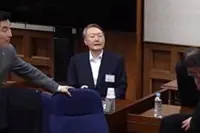SEOUL: South Korea’s truth commission has concluded that the government bears responsibility for facilitating a foreign adoption programme rife with fraud and abuse, driven by efforts to reduce welfare costs and enabled by private agencies that often manipulated children’s backgrounds and origins.
The landmark report released Wednesday (March 26) followed a nearly three-year investigation into complaints from 367 adoptees in Europe, the United States, and Australia, representing the most comprehensive examination yet of South Korea’s foreign adoptions, which peaked under a succession of military governments in the 1970s and ’80s.





